Siemens GIGASET C580, GIGASET C585, GIGASET A585 Manual [th]
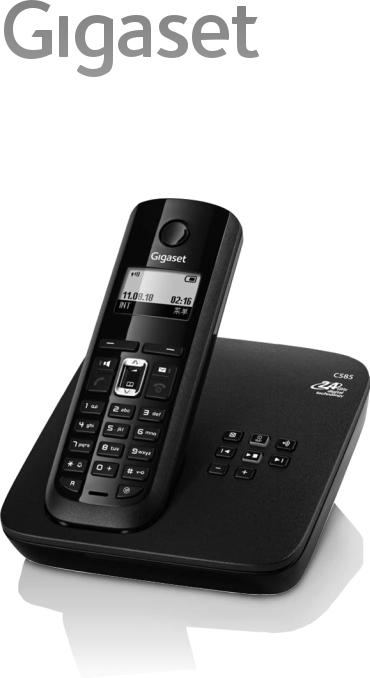
C580
C585
GIGASET. INSPIRING CONVERSATION.

The handset at a glance
16 |
|
|
|
|
1 |
|
|
Ð × |
V |
|
|||
|
|
2 |
||||
|
|
|||||
15

08.10.0107:15
INT Menu
14 |
|
|
|
|
|
3 |
||||
|
|
|
|
|
||||||
|
|
|
|
|
|
|
|
4 |
||
|
|
|
|
|
|
|
|
|||
|
|
|
|
|
|
|
|
|||
13 |
|
|
|
|
|
|
|
|
||
|
|
|
|
|
|
|
|
|||
12 |
|
|
|
|
|
|
5 |
|||
|
|
|
|
|
|
|||||
11 |
|
|
|
|
|
|
|
|
|
|
|
|
|
|
|
|
|
|
|
|
|
10 |
|
|
|
|
|
6 |
|
|
|
|
|
||||
9 |
|
|
|
|
|
|
7 |
|
|
|
|
|
|
||
8 |
|
|
|
|
|
|
|
|
|
|
|
|
|
|
|
|
|
|
|
|
|
|
|
|
|
|
|
||||
|
The handset at a glance |
1 |
Display in idle status (example) |
2 |
Charge status of the batteries(¢page 10) |
3 |
Display keys (¢page 16) |
4 |
Message key (¢page 26) |
Access to calls and message lists;
Flashes: new message or new call
5End call key, On/Off key
End call, cancel function, go back one menu level (press briefly), back to idle status (press and hold), activate/deactivate handset (press and hold in idle status)
6Hash key
Keypad lock on/off (press and hold in idle status);
toggle between upper/lower case and digits
7 |
IP key |
|
IP dialling (¢page 36) |
8 |
Microphone |
9 |
Recall key (¢page 42) |
- Recall (flash)
- Insert a dialling pause (press and hold)
10Star key
Ringer tones on/off (press and hold), With an existing connection:
Switch between dial pulsing/touch tone dialling¢(press briefly)
11Key 1 ( page 34)
Dial answer machine (C585 only)/network mailbox (press and hold)
12Talk key
Answer a call, open last number redial list (press briefly), start dialling (press and hold)
13Handsfree key
Switch between earpiece and handsfree mode;
Lights up: handsfree activated Flashes: incoming¢ call
14Control key ( page 16)
15Answer machine icon (C585 only) Answer machine switched on;
Flashes: Answer machine is recording a mes-
sage or is being operated by another internal party ¢
16 Signal strength ( page 10)
1
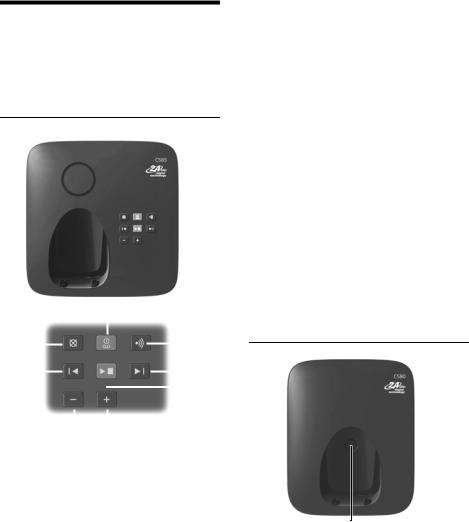
The base station at a glance
The base station at a glance
You can use the keys on the base station to register handsets to the base station, search for handsets (paging), ¢page 36 and operate the integrated answer machine (Gigaset C585 only).
Gigaset C585 base station
|
|
|
|
|
|
|
2 |
|
|
|
|
|
|
|
|
||
6 |
|
|
|
|
|
|
|
1 |
|
|
|
|
|
|
|
||
|
|
|
|
|
|
|
||
5 |
|
|
|
|
|
|
|
4 |
|
|
|
|
|
|
|
||
7 |
|
|
|
|
|
|
3 |
|
|
|
|
|
|
|
|||
|
|
|
|
|
||||
|
|
|
|
|
|
|
|
|
|
|
|
|
|
|
|
|
|
|
|
|
|
|
|
|
|
|
1Registration/paging key:
¢Press briefly: Search for handsets (paging), page 36.
Press and¢hold: Register handsets and WDCT devices, page 35.
2On/Off key: Activate/deactivate answer machine.
LED lights up: Answer machine is activated. LED flashes: The answer machine is recording a new message.
During message playback:
3Play/Stop key:
Play back new messages from answer machine or cancel the playback (press briefly).
Play back new and old messages (press and hold).
LED flashes: At least one new message is present.
LED flickers: Memory is full.
4Skip to next message (press once) or next message but one (press twice).
5Skip back to beginning of message (press once) or to previous message (press twice).
6 |
Delete current message. |
7 |
Adjust volume during message playback: ð |
= quieter; ñ = louder.
While an external call is being signalled: adjust ringer tone volume.
Please note:
uIf the answer machine is being operated from a handset or if it is recording a message, it cannot be operated from the base station.
uIf the LED flashes although the answer machine is switched off, it means that there is still at least one new message that has not been played back yet.
Gigaset C580 base station
Registration/Paging key:
– |
Press briefly: Search for handsets (paging), |
|
¢page 36. |
– |
Press and hold: Register handsets and |
|
WDCT devices, ¢page 35. |
2
Contents
Contents
The handset at a glance . . . . . . . . . . . . . . . . . . . . . . . . . . . . . . . . . . . . . . . . . . . . 1 The base station at a glance . . . . . . . . . . . . . . . . . . . . . . . . . . . . . . . . . . . . . . . . 2 Safety precautions . . . . . . . . . . . . . . . . . . . . . . . . . . . . . . . . . . . . . . . . . . . . . . . . . 5 First steps . . . . . . . . . . . . . . . . . . . . . . . . . . . . . . . . . . . . . . . . . . . . . . . . . . . . . . . . . 6
Check the package contents . . . . . . . . . . . . . . . . . . . . . . . . . . . . . . . . . . . . . . . . . . . . . . . . . |
. 6 |
Setting up the base station and charging cradle (if included) . . . . . . . . . . . . . . . . . . |
. 7 |
Connecting the base station . . . . . . . . . . . . . . . . . . . . . . . . . . . . . . . . . . . . . . . . . . . . . . . . . . |
7 |
Connecting the charging cradle (if included) . . . . . . . . . . . . . . . . . . . . . . . . . . . . . . . . . . |
8 |
Setting up the handset for use . . . . . . . . . . . . . . . . . . . . . . . . . . . . . . . . . . . . . . . . . . . . . . . . |
9 |
What would you like to do next? . . . . . . . . . . . . . . . . . . . . . . . . . . . . . . . . . . . . . . . . . . . . . . |
15 |
Using the phone . . . . . . . . . . . . . . . . . . . . . . . . . . . . . . . . . . . . . . . . . . . . . . . . . . 16
Control key . . . . . . . . . . . . . . . . . . . . . . . . . . . . . . . . . . . . . . . . . . . . . . . . . . . . . . . . . . . . . . . . . . 16 Display keys . . . . . . . . . . . . . . . . . . . . . . . . . . . . . . . . . . . . . . . . . . . . . . . . . . . . . . . . . . . . . . . . . 16 Keys on the keypad . . . . . . . . . . . . . . . . . . . . . . . . . . . . . . . . . . . . . . . . . . . . . . . . . . . . . . . . . . 17 Correcting incorrect entries . . . . . . . . . . . . . . . . . . . . . . . . . . . . . . . . . . . . . . . . . . . . . . . . . . 17 Menu guidance . . . . . . . . . . . . . . . . . . . . . . . . . . . . . . . . . . . . . . . . . . . . . . . . . . . . . . . . . . . . . . 17 Activating/deactivating the handset . . . . . . . . . . . . . . . . . . . . . . . . . . . . . . . . . . . . . . . . . . 18 Activating/deactivating the keypad lock . . . . . . . . . . . . . . . . . . . . . . . . . . . . . . . . . . . . . . 18 Illustration of operating steps in the user guide . . . . . . . . . . . . . . . . . . . . . . . . . . . . . . . 19
Menu tree . . . . . . . . . . . . . . . . . . . . . . . . . . . . . . . . . . . . . . . . . . . . . . . . . . . . . . . . 20 Making calls . . . . . . . . . . . . . . . . . . . . . . . . . . . . . . . . . . . . . . . . . . . . . . . . . . . . . . 22
Making an external call . . . . . . . . . . . . . . . . . . . . . . . . . . . . . . . . . . . . . . . . . . . . . . . . . . . . . . |
22 |
Ending a call . . . . . . . . . . . . . . . . . . . . . . . . . . . . . . . . . . . . . . . . . . . . . . . . . . . . . . . . . . . . . . . . . |
22 |
Answering a call . . . . . . . . . . . . . . . . . . . . . . . . . . . . . . . . . . . . . . . . . . . . . . . . . . . . . . . . . . . . . |
22 |
Calling Line Identification . . . . . . . . . . . . . . . . . . . . . . . . . . . . . . . . . . . . . . . . . . . . . . . . . . . . |
22 |
Handsfree talking . . . . . . . . . . . . . . . . . . . . . . . . . . . . . . . . . . . . . . . . . . . . . . . . . . . . . . . . . . . . |
23 |
Muting . . . . . . . . . . . . . . . . . . . . . . . . . . . . . . . . . . . . . . . . . . . . . . . . . . . . . . . . . . . . . . . . . . . . . . |
23 |
Using the directory and lists . . . . . . . . . . . . . . . . . . . . . . . . . . . . . . . . . . . . . . . |
24 |
Directory . . . . . . . . . . . . . . . . . . . . . . . . . . . . . . . . . . . . . . . . . . . . . . . . . . . . . . . . . . . . . . . . . . . . |
24 |
Last number redial list . . . . . . . . . . . . . . . . . . . . . . . . . . . . . . . . . . . . . . . . . . . . . . . . . . . . . . . |
26 |
Opening lists with the message key . . . . . . . . . . . . . . . . . . . . . . . . . . . . . . . . . . . . . . . . . . |
26 |
Making cost-effective calls . . . . . . . . . . . . . . . . . . . . . . . . . . . . . . . . . . . . . . . . 28
Automatic network provider code (preselection) . . . . . . . . . . . . . . . . . . . . . . . . . . . . . . 28 Displaying the call duration . . . . . . . . . . . . . . . . . . . . . . . . . . . . . . . . . . . . . . . . . . . . . . . . . . 29
Operating the answer machine of the
Gigaset C585 base station . . . . . . . . . . . . . . . . . . . . . . . . . . . . . . . . . . . . . . . . . 30
Operation via the handset . . . . . . . . . . . . . . . . . . . . . . . . . . . . . . . . . . . . . . . . . . . . . . . . . . . . 30 Activating/deactivating call screening . . . . . . . . . . . . . . . . . . . . . . . . . . . . . . . . . . . . . . . . 32 Setting up the answer machine . . . . . . . . . . . . . . . . . . . . . . . . . . . . . . . . . . . . . . . . . . . . . . 32 Resetting fast access for the answer machine using key 1 . . . . . . . . . . . . . . . . . . . . . . 32 Operating when on the move (remote operation) . . . . . . . . . . . . . . . . . . . . . . . . . . . . . 33
3
Contents
Using the network mailbox . . . . . . . . . . . . . . . . . . . . . . . . . . . . . . . . . . . . . . . |
34 |
Configuring fast access for the network mailbox . . . . . . . . . . . . . . . . . . . . . . . . . . . . . . |
34 |
Viewing the network mailbox report . . . . . . . . . . . . . . . . . . . . . . . . . . . . . . . . . . . . . . . . . |
34 |
ECO WDCT . . . . . . . . . . . . . . . . . . . . . . . . . . . . . . . . . . . . . . . . . . . . . . . . . . . . . . . 35 Setting the alarm clock . . . . . . . . . . . . . . . . . . . . . . . . . . . . . . . . . . . . . . . . . . . 35
Using several handsets . . . . . . . . . . . . . . . . . . . . . . . . . . . . . . . . . . . . . . . . . . . 35
Registering handsets . . . . . . . . . . . . . . . . . . . . . . . . . . . . . . . . . . . . . . . . . . . . . . . . . . . . . . . . . 35 De-registering handsets . . . . . . . . . . . . . . . . . . . . . . . . . . . . . . . . . . . . . . . . . . . . . . . . . . . . . . 36 Locating a handset ("paging") . . . . . . . . . . . . . . . . . . . . . . . . . . . . . . . . . . . . . . . . . . . . . . . . 36 Making internal calls . . . . . . . . . . . . . . . . . . . . . . . . . . . . . . . . . . . . . . . . . . . . . . . . . . . . . . . . . 36 Listening in to an external call (conference) . . . . . . . . . . . . . . . . . . . . . . . . . . . . . . . . . . . 37
Handset settings . . . . . . . . . . . . . . . . . . . . . . . . . . . . . . . . . . . . . . . . . . . . . . . . . 37
Changing date and time . . . . . . . . . . . . . . . . . . . . . . . . . . . . . . . . . . . . . . . . . . . . . . . . . . . . . 37 Changing the display language . . . . . . . . . . . . . . . . . . . . . . . . . . . . . . . . . . . . . . . . . . . . . . 38 Setting the display . . . . . . . . . . . . . . . . . . . . . . . . . . . . . . . . . . . . . . . . . . . . . . . . . . . . . . . . . . . 38 Activating/deactivating auto answer . . . . . . . . . . . . . . . . . . . . . . . . . . . . . . . . . . . . . . . . . 38 Changing the handsfree/earpiece volume . . . . . . . . . . . . . . . . . . . . . . . . . . . . . . . . . . . . 38 Changing ringer tones . . . . . . . . . . . . . . . . . . . . . . . . . . . . . . . . . . . . . . . . . . . . . . . . . . . . . . . 38 Advisory tones . . . . . . . . . . . . . . . . . . . . . . . . . . . . . . . . . . . . . . . . . . . . . . . . . . . . . . . . . . . . . . . 39 Restoring the handset to the factory settings . . . . . . . . . . . . . . . . . . . . . . . . . . . . . . . . . 40
Base station settings . . . . . . . . . . . . . . . . . . . . . . . . . . . . . . . . . . . . . . . . . . . . . . 40
Protecting against unauthorised access . . . . . . . . . . . . . . . . . . . . . . . . . . . . . . . . . . . . . . . 40 Changing ringer tones . . . . . . . . . . . . . . . . . . . . . . . . . . . . . . . . . . . . . . . . . . . . . . . . . . . . . . . 40 Restoring the base station to the factory settings . . . . . . . . . . . . . . . . . . . . . . . . . . . . . 40
Connecting the phone to a PABX . . . . . . . . . . . . . . . . . . . . . . . . . . . . . . . . . . 42
Dialling modes and recall . . . . . . . . . . . . . . . . . . . . . . . . . . . . . . . . . . . . . . . . . . . . . . . . . . . . 42 Setting pauses . . . . . . . . . . . . . . . . . . . . . . . . . . . . . . . . . . . . . . . . . . . . . . . . . . . . . . . . . . . . . . . 42 Switching temporarily to touch tone dialling (DTMF) . . . . . . . . . . . . . . . . . . . . . . . . . . 42
Customer Care and support . . . . . . . . . . . . . . . . . . . . . . . . . . . . . . . . . . . . . . . 43
Questions and answers . . . . . . . . . . . . . . . . . . . . . . . . . . . . . . . . . . . . . . . . . . . . . . . . . . . . . . |
43 |
Environment . . . . . . . . . . . . . . . . . . . . . . . . . . . . . . . . . . . . . . . . . . . . . . . . . . . . . 44
Appendix . . . . . . . . . . . . . . . . . . . . . . . . . . . . . . . . . . . . . . . . . . . . . . . . . . . . . . . . 45
Care . . . . . . . . . . . . . . . . . . . . . . . . . . . . . . . . . . . . . . . . . . . . . . . . . . . . . . . . . . . . . . . . . . . . . . . . . 45 Contact with liquid . . . . . . . . . . . . . . . . . . . . . . . . . . . . . . . . . . . . . . . . . . . . . . . . . . . . . . . . . . 45 Specifications . . . . . . . . . . . . . . . . . . . . . . . . . . . . . . . . . . . . . . . . . . . . . . . . . . . . . . . . . . . . . . . . 45 Writing and editing text . . . . . . . . . . . . . . . . . . . . . . . . . . . . . . . . . . . . . . . . . . . . . . . . . . . . . . 46
Accessories . . . . . . . . . . . . . . . . . . . . . . . . . . . . . . . . . . . . . . . . . . . . . . . . . . . . . . . 47 Mounting the base station to the wall . . . . . . . . . . . . . . . . . . . . . . . . . . . . . 48 Mounting the charging cradle to the wall . . . . . . . . . . . . . . . . . . . . . . . . . . 48 Index . . . . . . . . . . . . . . . . . . . . . . . . . . . . . . . . . . . . . . . . . . . . . . . . . . . . . . . . . . . . 49
4
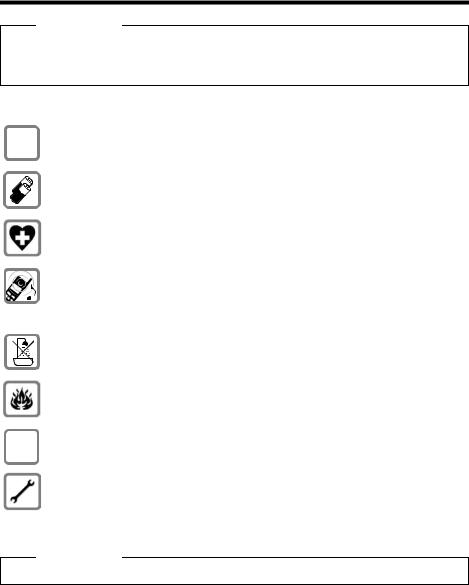
Safety precautions
Safety precautions
Warning
Read the safety precautions and the user guide before use.
Explain their contents and the potential hazards associated with using the telephone to your children.
Only use the mains adapter supplied, as indicated on the underside of the base sta- $ tion or charging cradle.
Only use the recommended, rechargeable batteries (¢page 45), i.e. never use a conventional (non-rechargeable) battery or other battery types as this could result in significant health risks and personal injury.
The operation of medical appliances may be affected. Be aware of the technical conditions in your particular environment, e.g. doctor's surgery.
Do not hold the rear of the handset to your ear when it is ringing or when
the handsfree function is activated. Otherwise you risk serious and permanent damage to your hearing.
The handset may cause an unpleasant humming noise in hearing aids.
Do not install the base station or charging cradle in bathrooms or shower rooms. The base station and charging cradle are not splash proof (¢page 45).
Do not use your phone in environments with a potential explosion hazard (e.g. paint shops).
ƒIf you give your Gigaset to someone else, make sure you also give them the user guide.
Please remove faulty base stations from use or have them repaired our service, as they could interfere with other wireless services.
Please note
Not all of the functions described in this user guide are available in all countries.
5
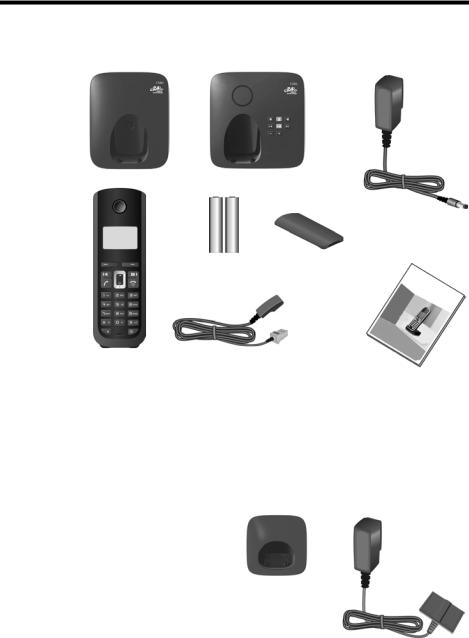
First steps
First steps
Check the package contents
1 |
or |
2 |
3 |
5 |
6 |
|
7
4
1 one Gigaset C580/C585/ base station,
2 one mains adapter,
3 one Gigaset C58H handset,
4 one phone cord,
5 two batteries,
6 one battery cover,
7 one user guide.
If you have purchased a |
8 |
9 |
model with multiple handsets the package should contain two batteries, a battery cover and a charging cradle 8with mains adapter 9for each additional handset.
6
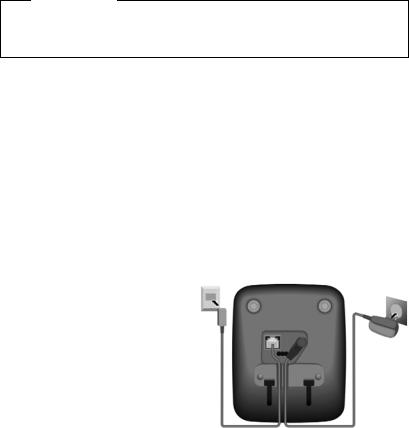
First steps
Setting up the base station and charging cradle (if included)
The base station and charging cradle are designed for use in enclosed dry rooms
¤Set up the base station and charging cradles at a central location on a flat, non- slip surface in your house or apartment.with a temperature range of +5 °C to +45 °C.
Please note
Pay attention to the range of the base station.
This is up to 300 m in unobstructed outdoor areas and up to 50 m inside buildings.
The phone's feet do not usually leave any marks on surfaces. However, due to the multitude of different varnishes and polishes used on today's furnishings, the occurrence of marks on the surfaces cannot be completely ruled out.
Instructions on how to mount the base station and charging cradle to a wall, see ¢page 48.
Please note:
uNever expose the telephone to the influence of heat sources, direct sunlight or other electrical devices.
u Protect your Gigaset from moisture, dust, corrosive liquids and vapours.
Connecting the base station
¤ First connect the
2 1
¤Then connect the telephone jack 2and
insert the cables into the cableducts.mains adapter 1.
Please note:
uThe mains adapter must always be connected, as the phone will not operate without mains connection.
uOnly use the mains adapter and phone cord supplied. Pin connections on telephone cables can vary (pin connections ¢page 46).
7
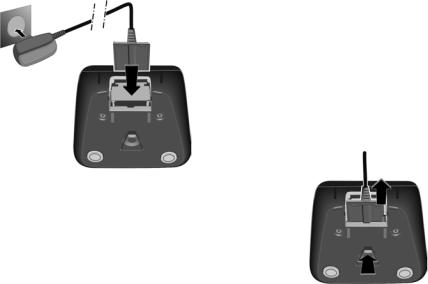
First steps
Connecting the charging cradle (if included)
2
¤ Connect the flat plug of the mains
1adapter 1.
¤Plug the mains adapter into the plug socket 2.
2
If you need to disconnect the plug from the charging cradle, press the release button 1
and disconnect the plug 2.
1
8
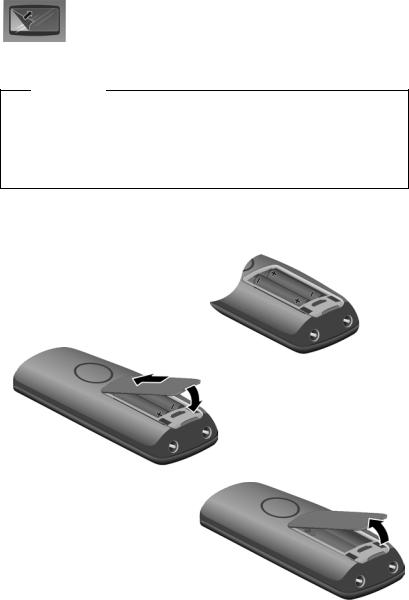
First steps
Setting up the handset for use
The display is protected by a plastic film. Please remove the protective film!
Inserting the batteries and closing the battery cover
Warning
Use only the rechargeable batteries recommended by
Gigaset Communications GmbH (¢page 45). Never use a conventional (nonrechargeable) battery or other battery types as this could result in significant health risks and personal injury. For example, the batteries could explode. The phone could also malfunction or be damaged as a result of using batteries that are not of the recommended type.
¤Insert the batteries the right way round.
The polarity is indicated in/on the battery compartment.
a
If you need to open the battery cover, for instance to replace the batteries, place your fingertip in the cavity on the casing and pull the battery cover upwards.
¤ First insert the battery cover
bat the top a.
¤Then press the cover b until it clicks into place.
9
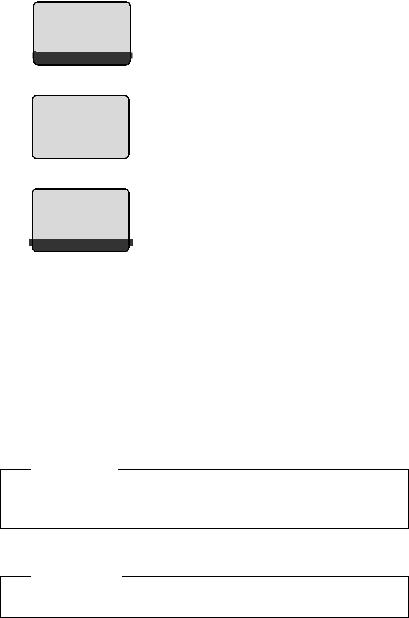
First steps
Placing the handset in the base station and registering
Place handset into base
Menu 
Handset is
registering
ë
ÐV
INT Menu 
Before you can use the phone, you must first
¤Place the handset with the display facing up in the base station.register the handset to the base station.
The handset registers automatically. Registration can take up to 5 minutes.
Do not remove the handset from the base station during this time.
The following is displayed after successful registration:
uthe strength of the reception signal between base station and handset:
–good to poor: Ð i Ñ Ò
–no reception: | flashes
ubattery charge status:
–= e V U (flat to full)
–= flashes: batteries almost flat
–e V U flashes: charging procedure
If you have purchased a model with multiple handsets, repeat the registration process for each handset. Handsets are assigned the lowest available internal number (1-4). If more than one handset is registered to the base station the internal handset number appears on the display, e.g. INT 2. If the internal numbers 1–4 are already assigned to other devices, the number 4 will be overwritten.
Please note
u Each key press interrupts the automatic registration.
uIf automatic registration does not work, the handset will have to be registered manually (¢page 36).
To charge the batteries, leave the handset in the charging cradle.
Please note
Only place the handset in the base station or charging cradle that is intended for it.
Should you have any questions and problems ¢page 43.
10
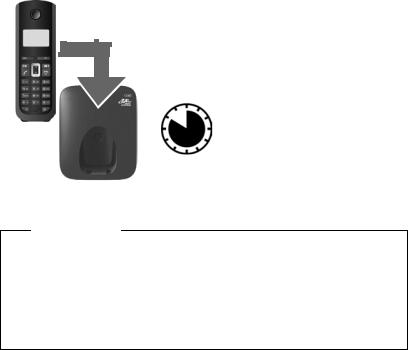
First steps
Initial charging and discharging of batteries
The correct charge level can only be displayed if the batteries are first fully charged and discharged.
¤ Place the handset in the base station or charging cradle for ten hours.
¤ Then remove the handset 10 h from the base station or
charging cradle and do not replace it until the batteries are completely discharged.
Please note
uAfter the first battery charge and discharge you may replace your handset in its base station or charging cradle after every call.
uAlways repeat the charging and discharging procedure if you remove the batteries from the handset and reinsert them.
u The batteries may warm up during charging. This is not dangerous.
uAfter a while, the charge capacity of the batteries will decrease for technical reasons.
11

First steps
Setting the date and time
Set the date and time so that the correct date and time can be assigned to incoming calls, and so that the alarm can be used.
INT Menu
Settings
ÇU OK
Date/Time
Ç U OK
¤Press the key below §Menu§ on the display screen to open the main menu.
¤Press the bottom of the control key
...
... until the Settings menu item appears.
¤Press the key below §OK§ on the display screen to confirm your selection.
The Date/Time menu item appears on the display.
¤Press the key below §OK§ on the display screen to open the input field.
12
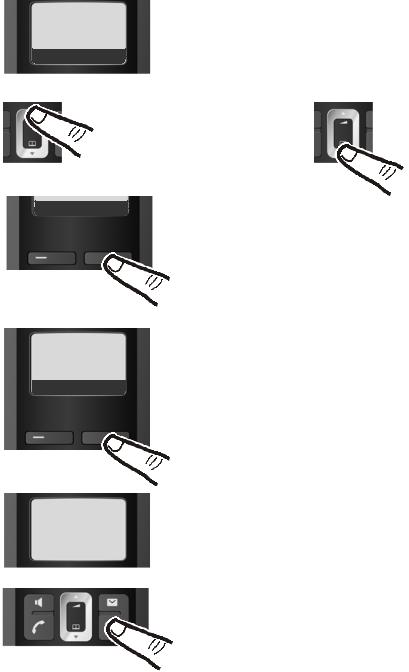
Enter Date:
[2008.10.01]
Ç T OK
First steps
¤The active line is marked [...].
Enter day, month and year as an 8-digit number via the handset, e.g. Q Q2QQN for 08/10/01.
If you want to correct an entry, press the top or bottom of the control key to toggle between fields.
ÇT OK
Enter Time:
[07:15]
ÇT OK
Saved
¤Press the key below §OK§ on the display screen to confirm your selection.
¤Enter the hours and minutes as four digit
numbers via the handset
e.g. Q M 5 for 7:15 hours. If necessary, use the control key to toggle between fields.
¤Press the key below §OK§ on the display screen to confirm your selection.
The display shows Saved. You will hear a confirmation tone.
¤Press and hold the end call key a to return to the idle status.
13

First steps
Display in idle status
Once the phone is registered and the time set, the idle display is shown as in this example. If the answer machine is activated, the answer machine icon × will also be displayed in the header.
Your answer machine is set with a pre-recorded announcement.
Your phone is now ready for use.
ÐV
08.10.01 07:15
INT Menu
14

First steps
What would you like to do next?
Now you have successfully started your Gigaset you will probably want to adapt it to your personal requirements. Use the following guide to quickly locate the most important subjects.
If you are unfamiliar with menu-driven devices such as other Gigaset telephones you should first read the section entitled "Using the phone" ¢page 16.
Information on ...
Setting the ringer tone melody and volume
Setting the handset volume
Recording a personal message for the answer machine
Operating the telephone on a PABX
Registering existing Gigaset handsets to a base station
Transferring directory entries from existing Gigaset handsets to the new handset(s)
... gis located here. page 38
g page 38
g page 30
g page 42
g page 35
g page 25
If you have any questions about using your phone, please read the tips on troubleshooting (¢page 43) or contact our Customer Care team (¢page 43).
15

Using the phone
Using the phone
Control key
In the following description the side of the control key you need to press for each operation is indicated accordingly, e.g. t for "press the top of the control key".
The control key has a number of different functions:
When the handset is in idle status
sOpen the directory.
tCall up the menu for setting the handset's call volume (¢page 38), ringer tones (¢page 38) and advisory tones (¢page 39).
In the main menu, in submenus and lists t / s Scroll up/down line by line.
Use the control key to move the cursor to the left t or right s.
During an external call
sOpen the directory.
tAdjust the loudspeaker volume for earpiece and handsfree mode.
Display keys
The function of the display keys changes depending on the particular operating situation. Example:
ÇU OK 
 Current display key functions are shown in the
Current display key functions are shown in the
|
|
|
bottom display line. |
|
|
|
Display keys |
|
|
|
|
Important display keys: |
|||
|
Open a context-dependent menu. |
||
Menu |
|||
|
Confirm selection. |
||
OK |
|||
W Delete key: deletes one character at a time from right to left. |
|||
|
Go back one menu level or cancel operation. |
||
|
Make an internal call. |
||
INT |
|||
16
